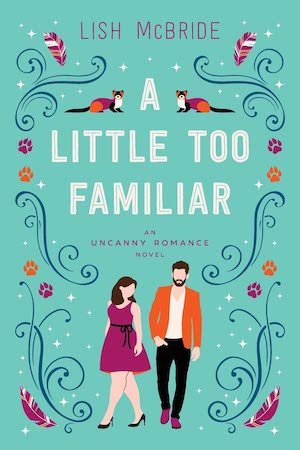In this bleak midwinter in a US election year, I find myself turning to romance for one of its core functions: comfort. This isn’t to say that romance lacks the ability to challenge and unsettle, but it’s comforting to feel sure, when you open a book, that the characters you fall in love with are going to be better off by book’s end than they were when you started. Recently, I was lucky enough to pick up Lish McBride’s first two romances, A Little Too Familiar and Rough Around the Hedges. They take place in a world where witches and magical beings are widely known about and accepted—thus circumventing my least favorite trope where witches will be in Danger unless they hide out in the suburbs. The books are about a group of variously magical friends who share houses and families and employment situations, and show up for each other no matter what. And then some of them realize they are in love and have sex in the big chair at the tattoo parlor.
A Little Too Familiar follows the romance of werewolf Declan and animal mage Lou, and Rough Around the Hedges is the story of Lou’s hedge witch roommate Vanessa and Declan’s coworker Will. In each book, the couple works together to cope with past traumas and current life crises, with the unwavering support of their circle of friends. I had a ball reading these. I wanted to get, like, a sandwich board made out of these two book covers and go all around town proclaiming the good news. I would blow my vuvuzela and then holler, “These books are so comforting!”
Except… are they? My former roommate can’t read anything with mind control, and Declan is a survivor of an awful magical cult where his father and stepmother placed him under sustained and total longterm mind control. At the start of A Little Too Familiar, the father and stepmother have just gotten out of magic jail, and they start pursuing Declan both in the physical world and in his dreams, a nightmare scenario that my oldest sister absolutely will not fuck with. A romance novel friend of mine does not enjoy to read about withholding parents, as she gets enough of that in real life; but Vanessa’s relationship with her dad, who’s what you would get if John Winchester were a university professor played by Bill Nighy, comprises a significant chunk of the plot of Rough Around the Hedges.
Buy the Book


A Little Too Familiar
Trigger warnings and content notes can allay some of these, at least for predictable triggers like abuse, disordered eating, suicide, etc. Many romance novels now open with a brief paragraph of trigger warnings, often coupled with the offer to read more detailed explanations at the author’s website—and I’m all for it! But our emotional triggers remain so personal and so specific to each of us that a full set of trigger warnings would be impossible. How could anyone know that my heart races when there’s scenes of floods or any kind of rushing water, to the point that I have to avert my eyes when the Ents destroy Isengard in The Two Towers? Or that my old roommate, who would gladly watch one action movie per day for the rest of her life, can’t cope with eye stuff?
I once spent the better part of a year trying to recommend books to a friend who said she was in need of “happy books.” It was unexpectedly enlightening. In each book rec I gave her, there would be something she didn’t find “happy.” Once she had pointed out the plot element in question, it was hard to argue that the book was indeed happy after all. Comfort recs suffer from a similar problem, even or perhaps especially within a genre that’s famously meant to be comforting. You could read A Little Too Familiar and say, “How is it comforting to read about a protagonist being stalked by his abusers?” You could read Rough Around the Hedges and say, “How is it comforting to read about a protagonist whose father is constantly undermining her and trampling her boundaries?”
It’s comforting because the adults who hurt Declan as a child don’t have the same power to hurt him as an adult. It’s comforting because as Declan falls in love, he also falls in family, and that family comes together to shield and protect him. It’s comforting because Vanessa can step back from her father’s relentless manipulations and decide that she’s not going to stick around for more of it. The dragon can be fought; you are not alone.
Lish McBride’s books comfort me because they point up the ways that people grow beyond the worst things that ever happened to them. It’s a theme that permeates her books. Even in the background of the main protagonists’ stories, you can see it happening: Lou’s father was a cheating bastard, far back in the midst of time, and so her mom and the Other Woman kicked him to the curb and moved in together, stitching their two families into one. I believe very strongly that our traumas are not our destinies. Surviving abuse does not shut us out from the possibility of belonging to a loving community. To the contrary, we can learn compassion and resourcefulness from the supportive people in our lives, and use those lessons to provide care to others in need.
In Rough Around the Hedges, Vanessa is talking to her sister about feeling like she has inappropriate responses to tender moments:
“If I wasn’t a broken robot, it would have been a nice moment. Instead, I’ve got cogs missing…. Remember that article you told me about, the one that said the human brain will rewire itself when it’s injured? Like, it will create new synapses and whatnot, build new connections, and sort of jury-rig itself into a ramshackle but workable new brain?”
“Yes,” Juliet said. “I remember that article.”
“I feel like I did that, but with my emotions.” I moved my hand up and down, indicating myself. “Emotionally rewired janky robot.”
I love this analogy, and I recognize it. McBride does a wonderful job of depicting those small moments in adulthood where people suddenly grapple with the little barbs left in their skin. At one point, Vanessa says, “This is one of those things, isn’t it? That I should be more upset about than I am?” and I said whew aloud, because I have spent some time in my life telling people I love to get fucking angry because the shit that happened to them isn’t okay. Vanessa doesn’t solve all of her emotional problems by the end of Rough Around the Hedges. What she does do, with the help of her loved ones, is develop new emotional skills that can allow her to receive care, and to be a caring support to her sister, her friends, and her boyfriend.
But you can see the problem here, can’t you? It doesn’t matter how intellectually compelling an argument I make for the comfortingness of this book or that book. If there’s something in there that bounces you out—something as major as the characters’ core traumas or as minor as the fact that you hate it when friend groups make secret bets on when their two friends are going to hook up—no amount of reasoned justification will create that feeling of comfort as you read. There’s a sort of ABO incompatibility issue to recommending comfort reads. If a book has comforted me, it’s easy for me to feel certain that it can be safely transfused into other people’s veins, easy to forget that comfort antibodies are as individual as they are numerous. (Stop the metaphor; I want to get off.)
In a piece about “fluffy” books from 2017, the late, lamented Corey Alexander wrote:
I can tell you how I talk about books like this. For me, one of the keys is holding the complexity… I often talk about the way stories like this balance humor with the hard things, and are able to hold them both.
An in-depth book review has the space to hold that complexity, offering readers a full picture of the kind of story they’re stepping into. But as spaces for longform book reviews continue to decline and disappear, and online book culture continues its shift from critical to promotional coverage, it’s challenging to know when a hoped-for comfort read can actually deliver. My own book recommendation style on social media might reasonably be described as avalanche, which is perhaps not the most conducive to Corey’s idea of holding space for complexity.
I love recommending books, but the conclusion I’ve reached, reluctantly, is that it’s impossible to promise comfort to another person, and it’s impossible to be promised comfort. A book with challenging, difficult content can be comforting, but we can’t reliably predict exactly whom it will be comforting to. So while I’m not exactly retiring from making comfort recs, I’m at least taking a step back to spend more time with my family.… Except for, I really think you’ll like A Little Too Familiar and Rough Around the Hedges. Keep an eye on those trigger warnings, and let me know what you think.










